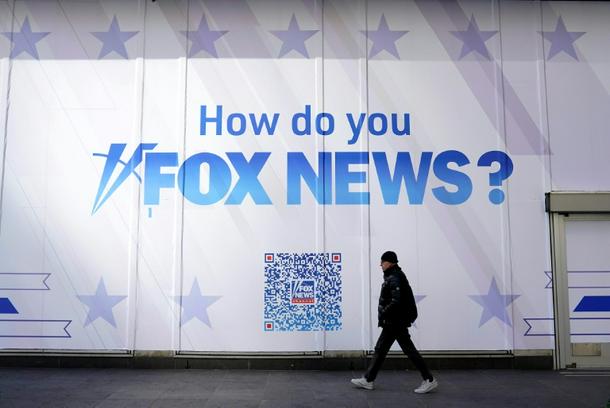
A pedestrian walks by a Fox News promo in New York City March 9, 2023
New York (AFP) - Can Fox News, media tycoon Rupert Murdoch’s influential conservative outlet, overcome its legal travails and revelations of behind-the-scenes intrigue?
A steady torrent of private messages, texts and emails from top network figures continue to surface as part of a defamation lawsuit, with each revelation enthralling US media and Democratic critics of the 24-hour news behemoth.
Brought by an electronic voting machine manufacturer, Dominion Voting Systems, the billion-dollar suit alleges that Fox News promoted former president Donald Trump’s false claims that its equipment was used to rig the 2020 election.
By releasing batches of company communications, Dominion’s lawyers have yanked the curtain back on what commentators and executives really felt about Trump, who counted on Fox News for steady support.
“We are very, very close to being able to ignore Trump most nights… I truly can’t wait,” Fox News star Tucker Carlson wrote to his team on January 4, 2021, two days before Trump supporters stormed the US Capitol in a bid to overturn the election.
“I hate him passionately.”
The internal Fox News documents and communications reveal that after the November 2020 election few people at the network, including Murdoch, believed Trump’s contention that the election was “stolen” by Democrats, especially through electronic voting.
But they kept their beliefs to themselves while letting conspiracists appear nightly on the prime-time shows of Sean Hannity, Laura Ingraham and Tucker Carlson.
- Fox ‘badly bloodied’ -
These contradictions are at the heart of Dominion’s lawsuit, which seeks $1.6 billion in damages in a civil trial slated for mid-April in the state of Delaware.
The Dominion lawsuit, Fox News tells AFP, is “nothing more than another flagrant attack on the First Amendment… (and) would have grave consequences for journalism across this country.”
The network adds that it was legitimate to give the Trump camp the floor when it challenged the vote and “essential for the search for the truth” to let all sides speak. It accuses Dominion of “cherry-picking and taking quotes out of context.”
But Dominion is giving Fox News a pounding.
“They have badly bloodied Fox,” said Mark Feldstein, a journalism professor at the University of Maryland.
“For a long time, we were like people at a theater watching a play. And you could see from watching Fox that it was full of lies.”
“What we didn’t know before this, is just how deliberate and intentional and orchestrated that was.”

Rupert Murdoch, president of Fox News and of News Corp., in Sun Valley, Idaho, on July 13, 2017
But Feldstein is cautious about what fallout the lawsuit might have on viewership. Fox News last year was the most watched cable news channel for a seventh year in a row, well ahead of competitors like MSNBC and CNN.
Facing rising competition from smaller, more full-throated right-wing outlets, some Fox hosts openly fretted about losing viewers if they backed off from conspiracy theories.
“They were promoting these lies, in large part, because their audience wanted to hear them,” Feldstein said.
- Possible financial impact -
Launched in 1996, the network has overcome several crises in past years, such as the sexual harassment scandals involving its iconic boss Roger Ailes, who died in 2017, and one of its iconic anchors, Bill O’Reilly, who was fired the same year.
There’s little doubt that if Dominion wins damages topping $1 billion, it would deal a blow to parent company, the Fox Corporation Group, which had revenues of $14 billion in its last full fiscal year. And Fox News is being sued in a similar case by another company, Smartmatic.
For now, the network is staying the course. This past week, Tucker Carlson devoted his show to seeking to downplay the violence of Trump’s supporters during the assault on the Capitol on January 6, 2021, with footage presented as exclusive.
“Beyond the court case, the likeliest consequences, if Fox faces any, will come from advertisers who deem the brand too untrustworthy to be associated with and from the viewers who decide to finally leave,” said Kyle Pope, editor of the Columbia Journalism Review.